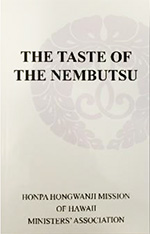
A message from Rev. Kosho Yagi which appears in the book, “The Taste of the Nembutsu,” published in 2016 by the HHMH State Ministers’ Association. The book is a collection of dharma messages by each of the active ministers.
To extend the reach of the dharma within these messages, we will publish one per week on our website.
What Did You Eat Last Night For Dinner?
By Rev. Kosho Yagi
When I think about food and ingredients, of course in Japanese, “O” is often attached to some names. For example; O-kome: rice, O-sakana: fish, O-niku: meat, O-soba: buckwheat noodles, O-miso, O-mame: beans, O-musubi, O-sushi, O-imo: potato, O-shoyu, O-shinko: pickled vegetables, O-tofu, O-sato: sugar, O-shio: salt, O-su: vinegar, O-kashi: sweets, O-manju, O-cha: tea…
In my dictionary “O” is a prefix denoting honor, and is therefore, a polite or courteous word. In the Heian period, the prefix “O” was limited to refer to Imperial court people. Today, “O” is widely used and reflects the speaker’s politeness to whom he or she speaks. But I believe “O” for food reflects respect and gratitude for food. Therefore “O” continues to be attached to foods valued since ancient times.
When I try to attach “O” to recent food especially western food, it becomes strange. O-hamburger, O-fried chicken, O-French fry, O-tacos, O-spaghetti, O-sandwich, O-locomoco… sounds funny, don’t you think so? I’m not blaming for western foods. It is the difference in gastronomic culture and language.
Anyway, how many people remember the words of thanks giving? Here is new version of Words of Thanksgiving:
We are truly grateful for this wonderful food,
a gift of the lives of many beings.
As we partake of this food, let us
remember Amida Buddha’s compassion
which surrounds all human beings and all forms of life.
Namo Amida Butsu, Itadakimasu. (We gratefully receive)
Please recite this Words of Thanksgiving with every meal. If you forget them, at least please say “Namo Amida Butsu, Itadakimasu” when given food. I understand that “Itadakimasu” or words of thanksgiving before a meal are said by many people, yet “Gochisosama” or thanksgiving after a meal is said by only few people. In my family we recite Words of thanksgiving after meals like this.
尊い お恵みにより おいしくいただきました。
お陰で ご馳走様でした。
Totoi omegumini yori oishiku itadaki mashita.
Okagede gochisou sama desita.
We thank Amida Buddha and all sentient beings for the food we have received. May it nourish us in mind and body that we joyfully and happily face our daily tasks.
(BCA Seiten)
Hawaii Kyodan’s new Words of Thanksgiving after meals are as follows.
We are grateful for the wonderful food of which
we have partaken. May the wisdom and compassion
of Amida Buddha so shine within our hearts that
the clouds of delusion may be dispelled and that
by our kind words and actions may we able to realize
true harmony in our daily lives.
Namo Amida Butsu. Gochiso Samadeshita (we appreciated this meal)
In the Japanese after meal words, “okage,” expresses appreciation for what has been received. Let us express respect and gratitude for the food and awaken to the benevolence of Amida’s great compassion, and endeavor in saying the Nembutsu. Let us try to remember the Words of Thanksgiving before meals and after meals.
信心のひとに おとらじと 疑心自力の 行者
如来大悲の 恩をしり 称名念仏 はげむべし
No less than people of Shinjin,
Practicers of doubt who cling
to self-power should
Awaken to the benevolence of
Amida’s great compassion
And endeavor in saying the Nembutsu
(Hymns of the Dharma Ages)
